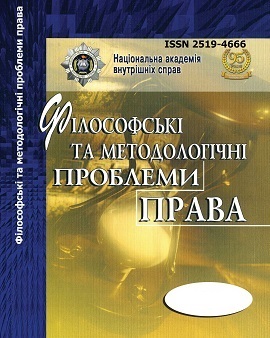Methodological Bases of a Scientific Study of the Status of the Reserve Judge in Criminal Proceedings of Ukraine
Abstract
The methodological principles of scientific research of the status of a reserve judge in the criminal proceedings of Ukraine are determined. The appropriateness of using a set of scientific methods, the use of which aimed at ascertaining the essence of certain legal categories from the studied issues, is substantiated and substantiated.
It is noted that the issue of involving an investigating judge in the criminal proceedings is clearly one of the few developed in the modern criminal process, but very important for the theory and practice of democratization of Ukrainian society. In this regard argued that in the methodological plane it is also one of the few worked out, and overcoming this gap for the Ukrainian criminal procedural branch of knowledge is an urgent need.
For a comprehensive analysis of the place and role of a secondary judge in the criminal justice system, a wide range of general scientific, special and specific scientific methods of cognition is used.
The emphasis placed on the principled possibility of studying the activities of a reserve judge in a criminal proceeding from the standpoint of synergetic, since the judicial activity itself characterized by systematic, complexity, openness and dynamism. It is in this plane that the process of realizing its powers carried out by the reserve judge, which, in essence, is the subject of interaction (confrontation, movement) of elements of the system under the influence of factors of the environment.
Concluded that by reflecting the institution of the reserve judge in the context of the realities of modern Ukraine it is expedient to use a methodological, complex approach, which involves a combination of a number of philosophical (dialectical, anthropological, axiological, hermeneutic), special-scientific,
in particular, special legal (sociological, legal, historical-legal, comparative-legal, formal-dogmatic, etc.), general scientific (analysis, synthesis, induction, deduction, systematic, objectivity, etc.) of methods that will allow illumination Institute spare you the judge to show his integrity and versatility.
Downloads
Abstract views: 130 PDF Downloads: 181
Copyright (c) 2018 Philosophical and Methodological Problems of Law

This work is licensed under a Creative Commons Attribution-NonCommercial-NoDerivatives 4.0 International License.
- Authors reserve the right to authorship of their own work and transfer to the magazine the right of the first publication of this work under the terms of the Creative Commons Attribution License, which allows other persons to freely distribute published work with mandatory reference to authors of the original work and the first publication of an article in this magazine.
- Authors have the right to enter into separate additional agreements on non-exclusive dissemination of the work in the form in which it was published in the journal (for example, to post an article in the institution's repository or to publish as part of a monograph), provided that the link to the first publication of the work in this journal is maintained.
- The journal's policy allows and encourages the posting of articles by authors on the Internet (for example, in electronic storehouses of institutions or on personal websites), both before the submission of this manuscript to the editorial office and during its editorial processing, as this contributes to the creation of a productive scientific discussion and positively affects the efficiency and dynamics of citing the published work.




